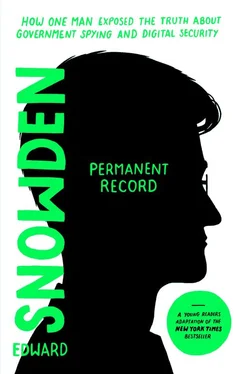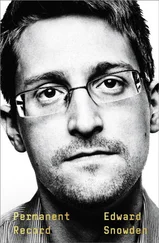TISOs are responsible for knowing how to fix basically every machine in the building, from individual computers and computer networks to solar panels, heaters and coolers, emergency generators, satellite hookups, military encryption devices, alarms, locks, and so on. The rule is that if it plugs in or gets plugged into, it’s the TISO’s problem.
TISOs also have to know how to build some of these systems themselves, just as they have to know how to destroy them—when an embassy is under siege, say, after all the diplomats and most of their fellow CIA officers have been evacuated. The TISOs are always the last guys out. It’s their job to send the final “off the air” message to headquarters after they’ve shredded, burned, wiped, and disintegrated anything that has the CIA’s fingerprints on it to ensure that nothing of value remains for an enemy to capture.
TISOs work under diplomatic cover with credentials that hide them among foreign service officers, usually under the identity of “attachés.” The largest embassies would have maybe five of these people, but most just have one. They’re called “singletons.” To be a singleton is to be the lone technical officer, far from home, in a world where everything is always broken.
My class in Warrenton began with around eight members and lost only one before graduation—which I was told was fairly uncommon. For the first time in my IC career, at age twenty-four, I wasn’t the youngest in the room. Most of the others were just tech-inclined people straight out of college, or straight off the street, who’d applied online.
We called each other by nicknames more often than by our true names. My nickname—I guess I can’t avoid it—was the Count because, like the vampire puppet of Sesame Street , I had a tendency to interrupt class by raising my forefinger, as if to say, One, two, three, ah, ha, ha, three things you forgot!
We’d cycle through some twenty different classes, each in its own specialty, but most having to do with how to make the technology available in any given environment serve the government of the United States, whether in an embassy or on the run.
One of Warrenton’s major subjects of study involved how to service the terminals and cables, the basic components of any CIA station’s communications infrastructure. A terminal , in this context, is just a computer used to send and receive messages over a single secure network. In the CIA, the word cables tends to refer to the messages themselves, but technical officers know that cables are also the cords or wires that for the last half century or so have linked the agency’s terminals all over the world, tunneling underground across national borders, buried at the bottom of the ocean.
Closing in on graduation, we had to fill out what were called dream sheets. We were given a list of the CIA stations worldwide that needed personnel and were told to rank them in the order of our preferences. These dream sheets then went to the Requirements Division, which promptly crumpled them up and tossed them in the trash—at least according to rumor.
My dream sheet started with what was called the SRD, the Special Requirements Division. This was technically a posting in Virginia, from which I would be sent out on periodic tours of places where the agency judged a permanent posting too harsh or too dangerous—tiny, isolated forward operating bases in Afghanistan, Iraq, and the border regions of Pakistan, for example. By choosing SRD, I was opting for challenge and variety over being stuck in just one city for the entire duration of what was supposed to be an up-to-three-years stint. My instructors were all pretty confident that SRD would jump at the chance to bring me on, and I was pretty confident in my newly honed abilities. But things didn’t quite go as expected.
As was evident from the condition of the Comfort Inn, the school had been cutting some corners. Some of my classmates had begun to suspect that the administration was actually violating federal labor laws by requiring unpaid overtime, denying leave, and refusing to honor family benefits.
These grievances came to a head when the decrepit stairs at the Comfort Inn finally collapsed. A few of my classmates approached me. They knew that I was well liked by the instructors, since my skills put me near the top of my class. They were also aware, because I’d worked at headquarters, that I knew my way around the bureaucracy. Plus I could write pretty well—at least by tech standards. They wanted me to act as a sort of class representative, or class martyr, by formally bringing their complaints to the head of the school.
Within an hour I was compiling policies to cite from the internal network, and before the day was done my email was sent. The next morning the head of the school had me come into his office. He admitted the school had gone off the rails but said the problems weren’t anything he could solve. “You’re only here for twelve more weeks—do me a favor and just tell your classmates to suck it up. Assignments are coming up soon, and then you’ll have better things to worry about. All you’ll remember from your time here is who had the best performance review.”
What he said had been worded in such a way that it might’ve been a threat, and it might’ve been a bribe. Either way, it bothered me. By the time I left his office, it was justice I was after.
I rewrote and re-sent the email—not to the head of the school now, but to his boss, the director of Field Service Group. Then I copied the email to his boss.
A few days later, we were in class when a frontoffice secretary came in and declared that unpaid overtime would no longer be required, and, effective in two weeks, we were all being moved to a much nicer hotel. I remember the giddy pride with which she announced, “A Hampton Inn!”
I had only a day or so to revel in my glory before class was interrupted again. This time, the head of the school was at the door, summoning me back to his office. There, waiting in the school head’s office, was the director of the Field Service Group—the school head’s boss, the boss of nearly everyone on the TISO career track, the boss whose boss I’d emailed. He was exceptionally cordial, which unnerved me.
I tried to keep a calm exterior, but inside I was sweating. The head of the school began our chat by reiterating how the issues the class had brought to light were in the process of being resolved. His superior cut him off. “But why we’re here is not to talk about that. Why we’re here is to talk about insubordination and the chain of command.”
If he’d slapped me, I would’ve been less shocked.
The CIA was quite different from the other civilian agencies, he said, even if, on paper, the regulations insisted it wasn’t. And in an agency that did such important work, there was nothing more important than the chain of command.
I pointed out that I’d tried the chain of command and been failed by it. Which was precisely the last thing I should have been explaining to the chain of command itself, personified just across a desk from me.
The head of the school just stared at his shoes and occasionally glanced out the window.
“Listen,” his boss said. “Ed, I’m not here to file a ‘hurt feelings report.’ Relax. I recognize that you’re a talented guy, and we’ve gone around and talked to all of your instructors, and they say you’re talented and sharp. Even volunteered for the war zone. That’s something we appreciate. We want you here, but we need to know that we can count on you. You’ve got to understand that there’s a system here. Sometimes we’ve all got to put up with things we don’t like because the mission comes first, and we can’t complete that mission if every guy on the team is second-guessing.” He paused, swallowed, and said, “Nowhere is this more true than in the desert. A lot of things happen out in the desert, and I’m not sure that we’re at a stage yet where I’m comfortable you’ll know how to handle them.”
Читать дальше












